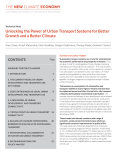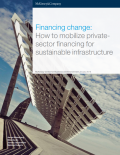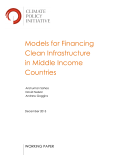
The 2015 EU Energy Union Package proposes integrating renewables into the market, just as the UK has moved away from Premium Feed-in Tariffs (FiTs) for renewable electricity supply (RES-E) to something closer to the standard FiT, which, when auctioned, demonstrated a 3% real fall in the weighted average cost of capital (WACC). The UK, which has experimented with nearly all forms of RES-E support, offers the evidence base for designing the Energy Union’s RES-E support. Innovation needs a further redesign to deliver adequate funding, best done through country contributions to an EU-wide innovation competition.

This report presents the current progress of Italy towards a green economy. It provides a clear overview of the diffusion of green businesses and practices within the manufacturing, building and trade industries, and the primary and tertiary sectors. The report highlights that about 40% of Italian firms are either:
- Core Green (i.e. firms that produce environmental goods and services, or firms whose outputs have low environmental impact); or
- Go Green (i.e. firms that are taking steps towards the greening of their supply chains and business practices).
Additionally the report offers an overview of the modern state of some themes which are strategically important for the transition to a green economy in Italy. In specific the report analyses the diffusion of renewable energy technologies, the improvements in energy efficiency, the reduced emissions of pollutant gases, circular economy, eco-innovation, land and natural resources management, ecological agriculture and sustainable transport.

Sustainable transport systems are crucial for underpinning the economic performance and prosperity of nations. They are also critical for tackling global climate change and reducing local air pollution. This is particularly the case in the world’s urban areas.
This paper provides an overview of the available evidence on the link between the effectiveness of transport systems and economic, social and environmental performance. It starts with a short overview of the main trends in urban transport, and then covers the costs of the current model of urban development and transport use and the benefits of an alternative model. It discusses potential tipping points in transport mobility worldwide and barriers to scaling up positive change. Finally it concludes with an overview of international collaborative initiatives on urban transport and with some recommendations for policy-makers.

Sustainable infrastructure is at the nexus of growth, poverty reduction and environmental sustainability, and is therefore important to making progress toward the 2015 Sustainable Development Goals, which aim to end poverty by 2030.
The report Financing Change: How to Mobilize Private-Sector Financing for Sustainable Infrastructure examines how to create the financing environment that could create a step change in private-sector capital flows into sustainable infrastructure. By evaluating and analyzing the global demand for infrastructure and the current lack of enough supply of finance, the report offers an overview of solutions to boost private-sector investment in sustainable infrastructure in a way that creates value for investors as well as improving climate and development outcomes.

Physical infrastructure, such as energy, transportation, telecommunications, water, and sanitation systems, can contribute to the sustained growth of a national economy. The global economy needs as much as $93 trillion of infrastructure investment through 2030, yet many analysts suggest that global investment is lagging behind the required rate.
This paper looks at the challenges faced by rapidly growing middle income countries in financing their infrastructure, and it focuses on the two seemingly very different models employed by the governments of Brazil and India to overcome those challenges. The paper assesses both the potential benefits and drawbacks of each model and how those potential benefits translate into practice once the particular national circumstances of each country come into play.
